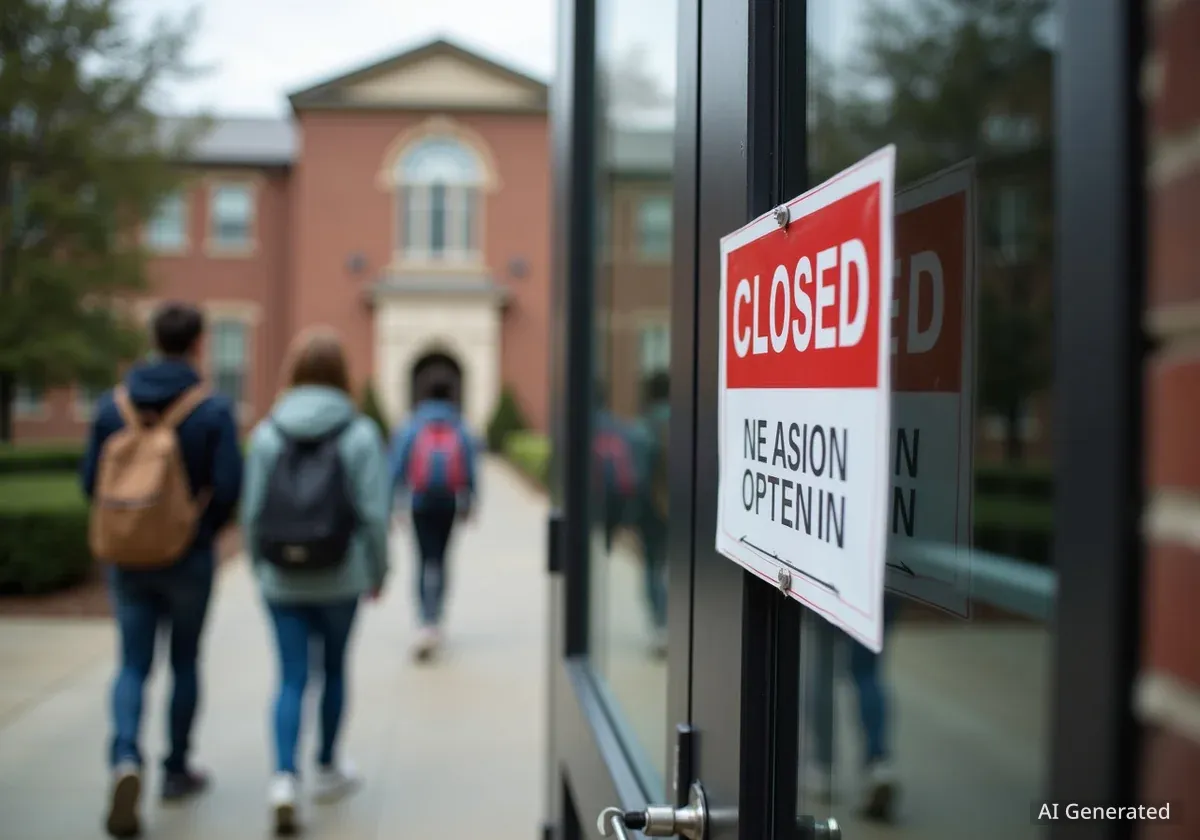The University of Arizona has shut down its four micro-campuses in China, a decision impacting over 2,200 students and dozens of faculty members. The move came shortly after a U.S. congressional committee report identified the partnerships as high-risk, prompting sharp criticism from students who say they have been unfairly abandoned.
Key Takeaways
- The University of Arizona closed four partner programs in China, affecting 2,200 students and 40 staff and faculty members.
- The decision followed a report from a U.S. House committee citing national security risks associated with the partnerships.
- Students and faculty have accused the university of breach of contract and acting on partisan political pressure.
- The university is offering affected students options to complete their degrees online or by transferring to the main campus in Tucson at a reduced tuition rate.
University Cites Federal Expectations for Closures
The University of Arizona (UA) announced the termination of its partnerships with four Chinese universities on September 22. This decision directly impacts approximately 2,200 students, 36 faculty, and four staff members who were part of these dual-degree programs.
The university's action was a direct response to a September 11 report from the Republican majority on the U.S. House Select Committee on the Chinese Communist Party. The report labeled UA's partnerships as "high-risk," alleging they could facilitate technology transfer and pose national security threats.
In a Faculty Senate meeting, Jenny Lee, Vice President and Dean of International Education, addressed the situation. "It is important to underscore the fact that the University of Arizona has terminated these institutional relationships in China. We did not terminate the students," Lee stated. She added that the decision was made to align with "federal expectations."
By the Numbers
- 2,200 students affected by the closures.
- 40 faculty and staff members impacted.
- 4 micro-campuses in China were shuttered.
- 11 days between the congressional report and the university's announcement.
Students Accuse University of Abandonment
Students enrolled in the affected programs have responded with letters expressing feelings of being "mercilessly abandoned." A letter from the UA-Ocean University of China (OUC) Joint Law Program Student Rights Committee argued that the university acted on the opinions of a small, partisan group rather than official U.S. government policy.
"We are deeply troubled that President (Suresh) Garimella misconstrues the opinions of a partisan subset of research committee members as binding ‘U.S. government expectations’," the students wrote. They argued this suggests a misunderstanding of the American governmental system.
Financial and Academic Disruptions
A primary concern for students is the financial burden of the alternatives proposed by UA. The university has offered students the option to transfer to the main campus in Tucson at the in-state tuition rate or to complete their degrees online. However, students claim these options are not financially viable.
According to their letter, transferring to the Tucson campus could increase their costs by $40,000 to $100,000, which they described as "an incredible sum for any family." They also criticized the online options for potentially including additional fees despite tuition already having been paid.
"The closure has severely disrupted our normal academic life and future educational plans, directly affecting the value of our degrees and our professional career prospects, causing us significant anxiety about our future."
- Letter from students in the UA-OUC Joint Law Program
Allegations of Contract Violation
Students also allege the university violated its contractual obligations. Their letter points to a clause in the UA-OUC contract requiring a 90-day written notice before termination. Instead, the university reportedly closed the programs just two days before classes were scheduled to begin and instructed professors to leave China immediately.
Faculty Members Criticize "Callous" Decision
Faculty members involved with the micro-campuses have also voiced strong opposition. Timothy Horley, a UA global professor who taught in the law program with Ocean University of China, argued that the program actually advanced American interests.
He explained that the curriculum taught Chinese students about essential American legal principles like due process, equal protection, and freedom of speech. "I have not heard one person articulate any reason why a program teaching such concepts to Chinese students hurts American interests," Horley said during the Faculty Senate meeting.
Background on the Micro-Campuses
The University of Arizona's micro-campuses, also known as dual-degree programs, allowed students in China to earn degrees from both UA and a partner Chinese university. The first of these, the joint law program with Ocean University of China, was established in 2015. These programs generated an estimated $25 million in yearly revenue for the university.
Faculty from the Arizona College of Technology at Hebei University of Technology, another closed program, sent a letter urging President Garimella to reverse the decision. They proposed creating a task force to design a "Secure micro-campus 2.0" that would address the security concerns while preserving the programs.
Miranda Pasquarella, another global professor, expressed her disappointment in the university's actions. "Anger that the University of Arizona could do something so cowardly. And shame that I agreed to work for such an institution," she said. "How could they give in without putting up a fight?"
University's Path Forward for Students
Despite the backlash, the university administration maintains that it is supporting the affected students. Provost Patricia Prelock confirmed that students will now receive single UA degrees instead of the previously offered dual degrees.
VP Jenny Lee elaborated on the support measures during the Faculty Senate meeting. "We’re also offering online continuation options... The cost for these programs to complete their degrees online is not expected to exceed the cost of the micro-campus tuition that the families and parents have prepared for," she explained.
The university has also engaged with student and faculty groups on the main campus, including the UA Faculty of Chinese Heritage Association, to hear concerns and provide reassurance. Arizona International, the university's global program, has held in-person sessions in China to explain the options to enrolled students.
The decision has been praised by some political figures. The Republican-led U.S. House Committee on Education and Workforce posted on X (formerly Twitter) that such programs are a "direct threat to U.S. national security" and that "Every American school should follow suit."





